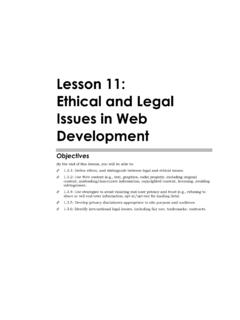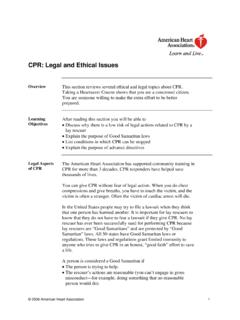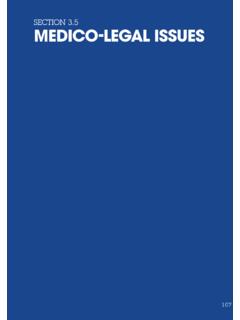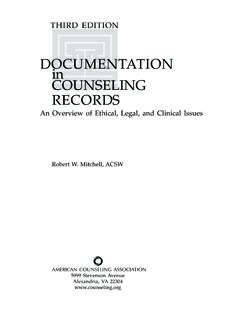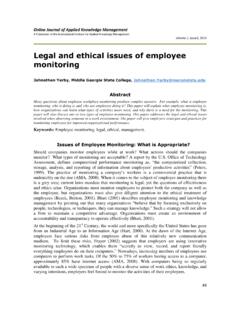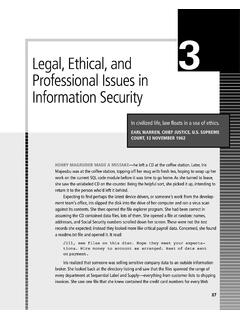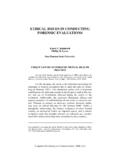Transcription of An Ethics Challenge for School Counselors
1 An Ethics Challenge for School Counselors Janet G. Froeschle and Charles Crews Texas Tech University 2 Abstract ethical issues arise more often for School Counselors than for those who work in other settings (Remley, 2002). The Challenge of working not only with minors but also with other stakeholders including parents, teachers, School administrators, and community members sets the stage for potential legal and ethical dilemmas. Awareness and adherence to ethical codes, therefore, is critical if School Counselors are to make appropriate, ethical decisions (Bodenhorn, 2006; Capuzzi, 2002; Glosoff & Pate, 2002). This article enhances School Counselors knowledge of ethical codes by using actual cases as submitted by School Counselors . The issues are presented in a quiz format to further discussion and relate each scenario to particular ethical codes. 3 An Ethics Challenge for School Counselors A review of the literature indicates several common ethical challenges faced by School Counselors .
2 Bodenhorn (2006) conducted a survey of School Counselors and indicated major ethical concerns as those related to handling student confidentiality, parental rights, and acting on information regarding student danger to self or others. Other researchers list not only the aforementioned issues as the most challenging but also include issues related to dealing with a colleague s ethical breach, appropriately collaborating with educational associates, and sharing information with family members and School personnel (Capuzzi, 2002; Froeschle, 2006; Glosoff & Pate, 2002; Huss & Mulet, 2008; Lazovsky, 2008; Moyer & Sullivan, 2008; White Kress, Costin, & Drouhard, 2006; Wilczenski & Coomey, 2006). Stone (2005) describes potential ethical challenges faced by School Counselors as related to privacy rights, status, and developmental levels of minors, values of School stakeholders, trust and confidentiality, issues related to informed consent, time constraints and number of students counseled.
3 Current Trends Solutions to the aforementioned problems have been suggested in the literature. For example, Froeschle and Moyer (2004) suggest explaining the limits of student confidentiality at the beginning of each counseling session. Further, these authors contend that parent/counselor discussions regarding the importance of student confidentiality occur such that trust is facilitated between stakeholders. For example, discussions facilitate understanding as to the importance of confidentiality within the counseling process and relationship. At the same time, parents are assured that crucial 4 information will be revealed. As such, a balance may occur between student confidentiality and parental rights. When acting on information regarding student danger to self, the aforementioned strategy ensures parents are informed with necessary information, students are informed about possible breach of confidentiality in advance, and as much confidentiality as possible is maintained.
4 It has been contended that students who indicate self harm be given choices as to how disclosure occurs. For example, students might call parents in the presence of the counselor, a student/parent/counselor meeting may be held, or the student may choose to have the counselor call parents on their behalf. Previous informed consent and the opportunity to make such choices may make the disclosure less traumatic for the self harming student as well as for those suffering harm via abuse (Froeschle & Moyer, 2004). The American School Counseling Association Code of Ethics (2004) specifically states that imminent harm be considered as an exception to confidentiality. Further, all states require some form of reporting when a counselor suspects child abuse (Remley & Herlihy, 2007). As a result, it has been suggested that Counselors suspecting abuse consider the welfare of students first and report despite concerns about violating student/counselor trust (Henderson, 2007; Remley & Herlihy, 2007).
5 The literature describes several additional strategies to prevent misunderstandings and manage ethical dilemmas. For example, publishing information and conducting staff trainings on informed consent, student confidentiality, and counseling services can be helpful for both parents and School faculty (Glosoff & Pate, 2002). Further, visiting classrooms and educating students about confidentiality and 5 counseling programs can proactively prevent future problems (Remley & Herlihy, 2007). Finally, the literature touts the use of decision making models as well as the importance of consultation with other professionals when managing ethical issues (Cottone, Tarvydas & Claus, 2007; Froeschle & Moyer, 2004; Remley & Herlihy, 2007). Consulting with other stakeholders can be an invaluable tool in managing ethical dilemmas and serving the needs of students. While much is gained through these interactions, it is important to disclose private student or family information only on a need to know basis (Henderson, 2007).
6 Disclosures should also take into consideration School personnel privacy rights. Again, it is crucial to reveal only necessary information as based on the best interest of the student or in consideration of legal constraints. School Counselors should never disclose information to have their own needs met (Remley & Herlihy, 2007). The School counselor s primary obligation is to the student (Froeschle & Moyer, 2004; Henderson, 2007; Remley & Herlihy, 2007). This includes advocating for students, defining the role of the counselor, and adjusting work assignments so student needs are met. Regular meetings between School Counselors and School principals have been touted as effective catalysts toward redirecting assignments that are counterproductive to student needs (Froeschle & Nix, 2009). It seems apparent that School Counselors need viable methods to educate themselves about ethical conduct as well as to educate other stakeholders. Realistic scenarios are often difficult to encounter and might assist in the aforementioned tasks.
7 This article was written to aid School Counselors as they seek solutions to ethical 6 dilemmas as well as to provide a nonthreatening format in which to enlighten principals and parents about appropriate responses. Description of ethical Scenarios The following ethical issues described in this article were submitted anonymously by School Counselors practicing in the panhandle of Texas. These cases were not solicited; rather, Counselors sent them to counselor educators at a local university so they might receive consultation. Permission was given from each contributor to use the cases in this article provided confidentiality and anonymity were maintained. As such, the issues discussed are realistic dilemmas actually faced by School Counselors . This article utilizes the American Counseling Association (ACA) Code of Ethics (2005) and American School Counselors Association (ASCA) ethical Standards for School Counselors (2004) to arrive at answers in the ensuing discussions.
8 While conclusive answers follow scenarios in the following cases, the quiz was written to offer an opportunity to evaluate knowledge of current ACA and ASCA codes of Ethics and facilitate discussions concerning other appropriate alternatives. Answers are provided to help School Counselors take a proactive rather than reactive stance when similar events occur (Calley, 2009). Nonetheless, School Counselors are encouraged to consult state statutes, School board policies, and professional colleagues before accepting answers as conclusive. Ethics Quiz for School Counselors The following scenarios actually occurred in the School setting (as submitted by School Counselors ) and are therefore, realistic events. Each case intends to acquaint School Counselors with situations faced by peers while assisting in the evaluation of 7 personal knowledge of codes of Ethics . Read each case below and determine the appropriate ethical / legal decision. Which ethical codes support your decision?
9 Answers and a discussion for each case follow. 1) The School counselor has been asked by the principal to assist with a classroom lesson. Having agreed to assist, the counselor, principal, and teacher are concurrently in a classroom teaching a reading lesson to 30 students. Another teacher (employed in the same building) arrives outside the aforementioned classroom door. The principal and counselor go to the door in order to visit privately with the apparently distressed teacher. The teacher states, The nurse says a student is in her office. She says he is very distraught and has cut himself intentionally. The nurse says she needs the School counselor to talk to this student right away. The principal responds, The counselor is busy right now. We will be done here in an hour. What is the ethical response of this School counselor? The School counselor might first consider, Who is my client and therefore, my priority? The ASCA ethical Standards for School Counselors (2004) states that the professional School counselor: A1a.
10 Has a primary obligation to the student, who is to be treated with respect as a unique individual. d. Delineates and promotes the counselor s role and function in meeting the needs of those served. Counselors will notify appropriate officials of conditions that may limit or curtail their effectiveness in providing programs and services. 8 The ACA Code of Ethics (2005) states: The primary responsibility of Counselors is to respect the dignity and to promote the welfare of clients. Consequently, the School counselor ideally will first serve the needs of the student. While it may be uncomfortable to disagree with the principal s initial statement, the ethical School counselor must find a way to place the student s needs first. A few suggestions that may aid School Counselors as they attempt to professionally overcome this obstacle are in order. First, the School counselor might reiterate the urgent nature of the request and say to the principal, I know as a student centered principal, you would want this student to be cared for right away.










